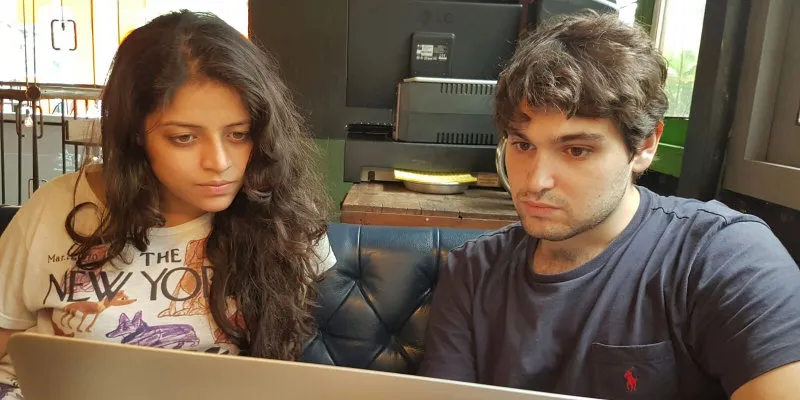Looking for the newest fashion in your area? – German startup Barqa shows customers and small shop owners the way
Barqa.in aims to take inventories of boutique fashion, handicraft, and furniture shops online, making them searchable to consumers online.

It’s Friday evening in Mumbai and you want to party in some of Mumbai’s hippest clubs. A look into your wardrobe leaves you disappointed.
Ordering a piece would just take too much time. Going on a shopping hunt in Bandra, not knowing where to go and find your favourite piece, would just be too time-consuming
You are left with three hours and your time is running out.
You want to search for new styles… the most exciting designers.
What do you do?
German startup Barqa is your to-go address. Barqa aims to take inventories of boutique fashion, handicraft, and furniture shops online, making them searchable to consumers online. (www.barqa.in).
Besides giving consumers the opportunity to find their desired piece in a nearby shop it gives small shop owners the possibility to get a super easy-to-manage online presence by simply organising their inventory.
Till date, 20 shops are showcasing their inventory on Barqa and the number is growing constantly. In order to improve the discovery experience for customers, Barqa is currently working on refining the search options to make it more relevant to people in specific locations.
Additionally, Barqa is improving the shop’s online presence by adding more possibilities for the shops that have subscribed to the platform to customise its page by allowing video content or blog posts.
From London to Mumbai
Barqa was founded in London by Wassily Graf and Shalaka Thakur. Barqa has been derived from the English word ‘barker’ which basically stands for a person who attempts to attract people to buy goods by shouting out prices and offers in the market place. “We thought of our business to be some sort of barker in the digital age, which is why we chose that name,” Wassily explains.
The idea for Barqa emerged when Wassily was looking for moving equipment in an unfamiliar neighborhood in London. He realised how useful it would be to be able to search for a product and see where you could find it on the map. After starting in London, Wassily’s co-founder Shalaka suggested to move the business to Mumbai.
“With its plethora of small independent shops and a gigantic unorganised retail market it seemed the perfect setting for such a business, especially compared to London with its dominating large corporations,” says Wassily.
Finding the right balance
While India is a very dynamic and interesting market and has opened up a lot of opportunities for Wassily and Shalaka, setting up their business in Mumbai has not been without any challenges.
After initiating the development of the platform, the software contractor they relied on went bankrupt, throwing all their timelines overboard.
With this experience, Wassily and Shalaka decided to do everything in-house which also didn’t quite work out. “I think finding a decent middle-ground is extremely important, especially at the beginning. You need some good in-house production that can be complemented by good outsourced work. It took a while to come to this realisation and strike this balance,” Wassily explains his challenges when starting Barqa in India. To find the right balance between work and private, Wassily on weekends travels to Goa and during the summer goes to Greece. “I really need this time to relax from the hectic Mumbai lifestyle,” he says.
Breaking out of the comfort zone
He does not come from a family of business founders, but Wassily’s mother, a professor of experimental physics, encouraged Wassily to break out of his comfort zone. “She taught me to be brave to take on new endeavours and also supported me when I decided to move to India,” says Wassily. After completing his studies, Wassily initially worked as a foreign exchange broker but soon realised that working in finance, or any similarly structured job was not what he was looking for.
“I think the crucial moment was when I realised that I couldn’t really see myself doing my job for another two-three years. But worse than that, I didn’t really see myself doing my boss’s or my boss’s boss’s job, or even his boss’s job. It occurred to me that all great companies once started as an idea, and in order to fulfil them one has to break out of that corporate corset to allow oneself to explore new possibilities.”
Bootstrapping versus funding
Besides generating first revenues from subscriptions, Barqa has been mostly self-funded. “Being self-funded taught us how to run a business in a cash-efficient way and make the most of our resources. It made Shalaka a better marketer and turned me into a better programmer,” Wassily explains his decision for not going for external funding.
In the future, Barqa plans to base their revenue model on three different streams of income: monthly subscriptions for the online presence and the inventory system, advertisement for allowing shops to prominently advertise on the landing page or in the search results, and, finally, fashion analytics by answering question such as, what products are being most searched for, what colours are the most successful, which piece of clothing is the most sought after, etc.
Wassily’s advice for other entrepreneurs is: “Invest your own money for a while – especially because I think seed funding in India is very difficult to obtain if you didn’t study at an IIT. It’ll definitely turn you into a better business person.”







